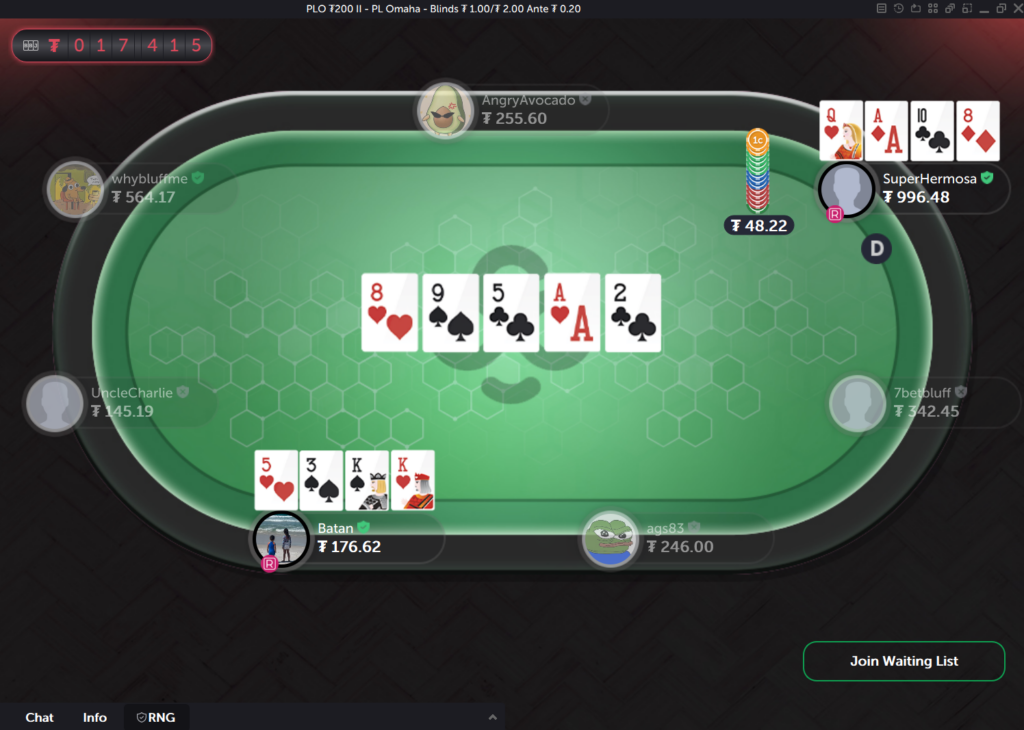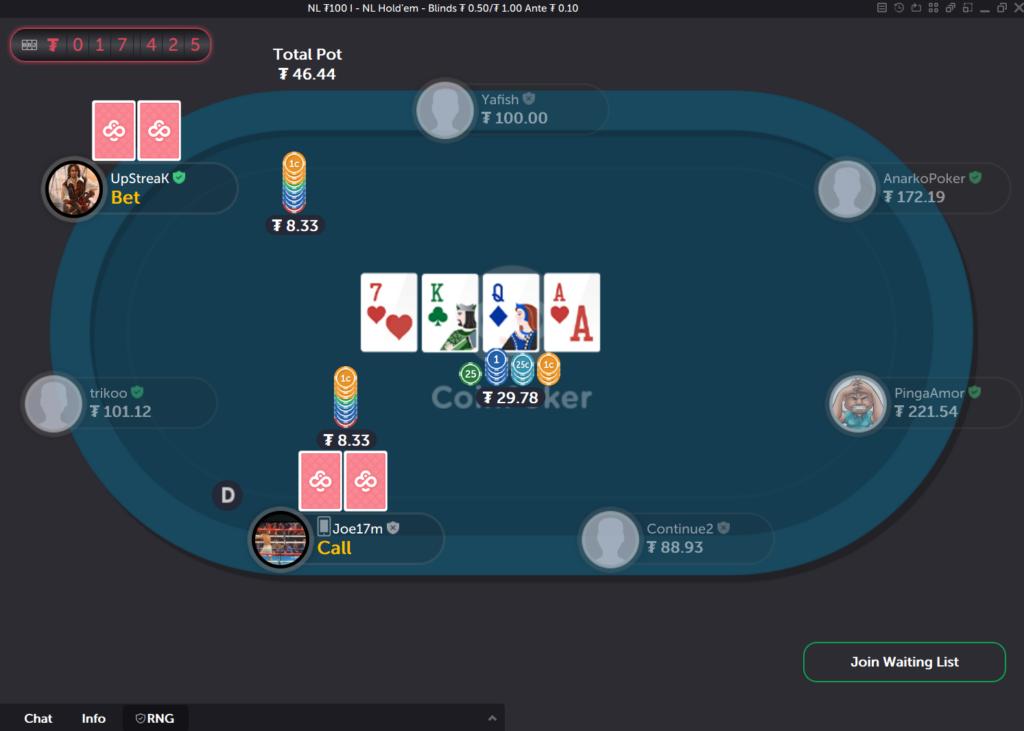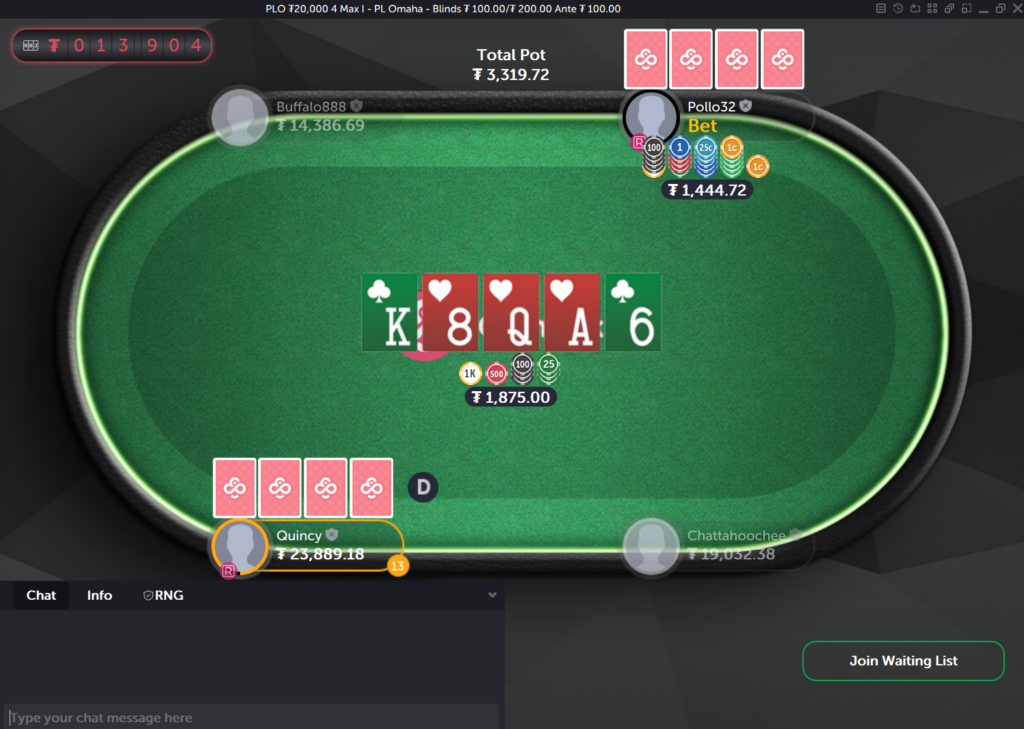Last Updated: 4 February 2026
Cash Game Strategy
Understanding cash game poker strategy is key for any players who want to be successful. Our guide covers it all, from beginner to advanced concepts.
StrategyUse Cash Game Poker Strategy to Raise Your Skill Level
In order to win at cash games, you will need more than just a buy-in and a little luck. A coherent and strong cash game poker strategy is the only way to win on a consistent basis. Such a strategy is made up of many elements, and we are going to lead you from the most basic ones to the ones you need to win in higher-stakes poker games.
On this page, we will introduce you to a full guide to cash game poker strategy. Whether you are a novice or an experienced player, you will find some tips that you can apply to your game that will help you improve your strategy and get better at the game of poker.
What Is Cash Game Poker?
Typically speaking, we can divide all poker games into tournaments and cash games. In cash game poker, players play with chips that directly correspond to their dollar value. For example, if you sit down in a $1/$2 cash game with $200, you will receive exactly $200 worth of chips and will need to pay a $1 small blind and a $2 big blind once an orbit.
Cash game poker allows players to sit down with any amount of chips between the minimum and maximum buy-in, add chips to their stack, or cash out their chips at any time. This is in contrast to tournament poker, where chips have no real money value. In tournament poker, you only get paid if you reach the top 10% or 15% of players by never losing your last chip in the process.
A typical cash game poker table is made up of anywhere between six and nine players. Online poker allows you to play stakes as low as $0.01/$0.02 with a buy-in as low as a single dollar. Of course, if you are interested in bigger games, stakes go up to $500/$1,000, allowing every player to pick their stakes and play at a level they are most comfortable with.

Advantages of Playing Cash Games vs. Tournaments
We already mentioned the basic difference between poker tournaments and cash games. The differences go beyond the simple format of the game, and many cash game players enjoy the various advantages they provide over tournaments.
Cash games allow for a lot more flexibility in terms of time commitment. You can buy into a cash game at any time and leave the table at any time. A thirty-minute cash game session can be greatly profitable, and you get to walk away with the profits right away.
Furthermore, there are significant differences between poker tournament vs cash game strategy. Cash games are played with deeper stacks, allowing for more elaborate plays, big bluffs, and thin value bets. In poker tournaments, the focus is often on different strategies that have to do with survival and laddering up the paytable, which is not the preference of all poker players.
Beginner Cash Game Poker Strategy
If you are new to cash game poker, you probably have many questions. The truth is poker is a complex game, and mastering cash game poker strategy can take a long time. It is important to start at the beginning and soak up the basic concepts before advancing to more complex topics.
Let’s take a look at some of the more basic poker strategies for cash games and concepts that you need to learn to start your journey in cash games.
Master Hand Rankings
The first thing you need to learn before you can start playing poker is the poker hand rankings chart. Knowing exactly how hands rank and what hand is better than others is foundational knowledge in this game.
In the simplest of terms, memorize the table below and keep it in mind every time you play a hand at the cash game tables. These are all possible poker hands ranked from best to worst:
- Royal Flush
- Straight Flush
- Four of a Kind
- Full House
- Flush
- Straight
- Three-of-a-Kind
- Two Pair
- One Pair
- High Card
Preflop Cash Game Strategy Tips
The first betting round is the foundation of all cash game strategy in poker. Here are a few useful tips to keep in mind when starting out in cash games:
- Tight is Right: If you are new to the game, play only the best hands out of early positions and expand your poker range slightly as you get closer to the dealer button.
- Don’t Limp: If the action is on you and other players have folded, come in for a raise or fold your cards. Don’t just call the blind (limp) and hope to see the flop. That’s not the objective of the game!
- Be Positionally Aware: Always know your position and what it means for you. Play more hands from late positions and fewer from early positions if you want to improve your results immediately.
- Re-Raise Your Strongest Hands: If you are facing a raise, make sure to go for a re-raise with your best hands like AA, KK, QQ, and AK from any position. Re-raise about 3x the original raise size to get value and protect your hand.
- Don’t Call Too Wide: If you are facing a raise, only call with your good speculative hands like 77, 66, T9s, and 98s, and re-raise your strong hands. Don’t call raises with hands like 96s or 85s looking to strike gold on the flop.
Postflop Cash Game Strategy Tips
After the preflop betting is all done, you will have many decisions left on the latter betting streets. Starting with the flop, here are a few basic tips we can give you for postflop play in cash games:
- Continuation Bet Often in Position: Once you have raised preflop, and your opponent checks the flop, bet the flop often. Your opponents will fold a lot, and you will get to pick up the pot.
- Protect Your Strong Hands: If you make a big hand on the flop, don’t slow-play it. Bet first or raise if another player bets to protect your hand and get value as soon as possible.
- Don’t Be Afraid to Bluff: You can’t only make bets with value hands. Don’t be afraid to turn your flush and straight draws into bluffs on the flop or turn.
- Don’t Get Married to Aces: Strong hands like pocket Aces win often, but not always. Don’t lose your entire cash game stack with Aces if the board runs particularly bad for you.
- Pot Control with Medium Hands: Learn how to control the size of the pot on the flop or turn so as not to get blown off your medium-strength hands by a big bet on the river.
Manage a Bankroll for Cash Games
A big part of any successful cash game poker strategy is bankroll management. No matter how well you play your cards, you will never make it in poker if you don’t know how to manage your bankroll. As you just start out, remember to stick to lower stakes and always play with a substantial number of buy-ins behind.
When it comes to online poker cash game strategy, your plan should be to have at least thirty to fifty buy-ins in your bankroll (if you play $0.05/$0.10 with a $10 buy-in, keep $300 to $500 in your bankroll). This way, you will be able to sustain any downswings you face and survive the variance that is inherent to cash game poker.
Specialize in a Specific Game
There are many different cash game formats you can try in online poker. At CoinPoker, we offer Texas Hold’em Poker, Pot Limit Omaha, and Five Card Pot Limit Omaha. Each of these games has its pros and cons, but our advice is to specialize in one and fully master it.
By focusing on a particular game format and constantly playing it, you can get a lot better a lot faster. If you jump from one game to another, you will often make mistakes across the board, fail to adapt to the game type you are playing, and never quite fully master the strategy for either.

Intermediate Cash Game Poker Strategy
So you have studied some basic poker strategies and managed to win at the micros? It’s time to move to the next stage of your poker career and learn more advanced poker concepts. The intermediate cash game poker strategy includes improving on many of the concepts you learned as a beginner, as well as introducing some completely new ones into your playbook.
Beginner poker strategies usually work at the lowest of stakes ($0.01/$0.02, $0.02/$0.05, $0.05/$0.10) but start to fail as the stakes get higher. Around the time you reach the $0.25/$0.50 blinds, you are likely to start coming across better players at the tables, requiring a new approach to cash game poker strategy.
With tougher opposition, you will need some new tricks, so here are a few intermediate cash game strategy tips you can use as you reach the mid-stakes.
Effectively Use Position in Cash Games
The importance of poker position increases as you face tougher opponents. While you could get away with raising trash hands from early position against weak players, better opponents will punish you for it. At higher stakes, it becomes imperative to play appropriate ranges across all positions.
In order to keep advancing your poker career, you will need to truly master positional play. This starts with learning which hands you can open and 3-bet from each position, as well as how to play from each position on the flop, turn, and river.
For example, you will have to start making bigger 3-bets out of position than in position and c-betting less frequently when OOP when facing more skillful players.
Value Betting in Cash Games
From the very start, you have learned that you need to make value bets with your strongest hands. However, as you start playing bigger games, you will also need to learn when to value bet with thin value hands, such as second pair on the turn and river.
Thin value betting gives you a chance to increase your win rate and further balance your ranges. If your value betting range can contain some weaker value hands, you can expect to start getting called more frequently, making your best hands even more profitable.
Bluffing in Cash Games
The importance of bluffing also goes up as you move up the stakes. Weak players are easy to bluff and get value from, but you will need to dig deeper as you face intermediate opposition.
Some useful tricks to use include using the board texture to represent strong hands, bluff more often against capped ranges, and use blockers in your hand to recognize good bluffing opportunities.
Finding the right time to bluff means knowing both what strong hands you can reasonably have in your range and what hands your opponents can have that they can fold. By mastering the art of bluffing, you will become more unpredictable and much harder to play against.
Adjusting to Your Opponents
While balance is an important part of any good cash game poker strategy, being able to adjust to your opponents can also be very useful. In order to know how to adjust, you must first learn your baseline strategy and know what move you would make against an average player. From there, you can adjust your strategy in either direction depending on your opponent.
For example, when facing a calling station (a player who calls too often), you will want to increase the frequency with which you bet for value, as well as the size of your value bets. On the other hand, you will need to bluff less frequently, as this opponent is unlikely to fold even his fairly weak hands.

Advanced Cash Game Poker Strategy
As you move up in stakes and beat the intermediate players, you will start facing some truly tough opponents at levels like $2/$5 and $5/$10. Playing against players in these games can be very difficult, as they are also aware of the strategies you use to beat the weaker players in the smaller games.
In order to win in these games, you will need to fully understand the mathematics behind the game, study balance and other game theory optimal concepts, and build unexploitable hand ranges.
Here are a few tips for advanced cash game strategy that you can apply at lower and higher stakes alike in order to profit against anyone.
Using Pot Odds to Find the Right Decision
Whenever you face a bet, you are facing a mathematical puzzle. Is calling the bet profitable or not? The only way to know is to understand the pot odds and how they apply to the situation at hand.
For example, if you are facing a bet of $50 into a $100 pot, you need to call $50 to win the $150 in the pot. With pot odds of 3/1, you should be calling if your hand has 25% equity or more. You can quickly figure out your equity by counting your outs and using the rule of two and four, but also by comparing your hand to your opponent’s perceived range.
Using Expected Value (EV) for Long-Term Success
As a poker player, you should not be results-oriented. Instead, you should look at every decision you make based on its long-term expected value (EV). EV is a mathematical concept that refers to the long-term result of a play you make, regardless of the short-term outcome.
For example, you face a river bet of $100 into a $100 pot from an aggressive player with KsKd on a board of Qh7s7h3c8d. Understanding you need just 33% equity to profitably call, you put in the $100 chip. Your opponent turns over Ac7c for three-of-a-kind, and you lose.
Did you make a mistake? Absolutely not! Your call had a positive expected value (+EV), and although it happened to lose this time, it is going to make you money in the long run against the aggressive opponent who could have many weaker hands than your pocket kings.
Game Theory Optimal (GTO) vs. Exploitative Strategy
One of the greatest dilemmas of poker players these days is whether to use a game theory optimal (GTO) or an exploitative cash game strategy. The truth is both have their advantages and drawbacks, and the answer depends on the context.
The GTO poker strategy aims for balance. For this reason, every bet or raise you make at any point in the hand should be made with a mixed range of bluffs and value hands. These hands are mixed at a ratio proportional to the bet size, making every bet profitable regardless of your opponent’s response to it.
Exploitative strategy, on the other hand, focuses on exploiting your opponent’s mistakes. If a player calls too much on the flop, the exploitative strategy dictates you should bet more for value and bluff less against them. If an opponent folds too much, you should be bluffing a lot more often to maximize the amount of chips you win from them.
The right approach depends on the opposition you are facing. Against tougher opponents who play a balanced strategy themselves, you should aim to play as close as possible to the GTO strategy. Against weaker opponents whose games are full of leaks, you should be playing in an exploitative manner every time.
Places to Play Cash Games and Practice
If you are ready to get into some cash game action, you can get started today, regardless of your bankroll. CoinPoker offers freeroll tournaments and other ways to build up your bankroll without any deposit, as well as micro-stakes games you can get into with a minimal deposit.
Sign up with CoinPoker today to start mastering the cash game poker strategy from scratch and put our tips to use to build up your bankroll and work your way up the stakes at the world’s premiere crypto poker site.
FAQs
Cash games are played with chips that have a real cash value and can be cashed out at any time.
A blend of balance and exploitative play is key to a successful cash game strategy.
You will typically need between 30 and 50 buy-ins to have a safe bankroll in online cash games.
Position, stack size, bet sizing, and bankroll management are all essential elements of a good cash game strategy.
CoinPoker offers a variety of low-stakes cash games where you can practice your strategy from scratch.
Explore More
Announcements
Read recent announcements from CoinPoker about new games, ambassadors, and changes to our platform.
8 PostsGuides
The go-to resource for mastering poker with expert tips and strategies. Our guides will elevate your poker skill level.
60 PostsNews
Find the latest poker news and latest CoinPoker Newsletters. Get updates about games, promotions, and crypto news.
98 PostsPromotions
Find the latest coinpoker promotions here. Explore the crypto poker world with the best poker promotions available.
1 Post
















